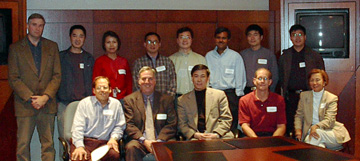 |
(Back row) Dr. Jim Shull, Dr. Jun Jin*, Dr. Yawei Yuan*, Dr. Zhengtang Chen*, Dr. Julun Yang*, Dr. Rakesh Singh, Dr. Jianxin Dai*, Dr. Dongxue Zhou*; (Front row) Dr. Barry Gold, Dr. Ken Cowan, Dr. Yajun Guo, Dr. Tony Hollingsworth and Dr. Judith Christman at the Oct. 4 Welcome Luncheon. The asterisk denotes visiting faculty members. |
On Oct. 4, Kenneth H. Cowan, M.D., Ph.D., director of the UNMC Eppley Cancer Center, recently welcomed the second set of six visiting faculty for the Shanghai University — UNMC Eppley Cancer Center Exchange Program.
In November, Dr. Cowan and Barry Gold, Ph.D., associate director of the cancer center, will meet with the Chinese Minister of Public Health and Dean of the Shanghai Medical School to celebrate the success of the program.
The program, which began in the summer of 2000, marks the first time the Chinese government has ever awarded and funded a faculty exchange program between a Chinese medical school and a U.S. medical school. The main purpose of the two-fold program is to promote international exchanges and develop new ways to diagnose, treat and prevent cancers.
Faculty from the Chinese medical school may apply for a one-year research fellowship at the UNMC Eppley Cancer Center. Currently, the program is approved for a five-year period with the potential of continuing for 10 or more years.
The UNMC Eppley Cancer Center was selected for the exchange program because of its world-renowned cancer program and its cutting-edge basic and clinical research, Dr. Cowan said.
“This program supplies our cancer center members with tremendous benefits as well,” he said. “The faculty from Shanghai Medical University have strong expertise in the field of immunotherapy research so they will be able to assist us in the development of tumor vaccines and other novel approaches to treatment.”
Shanghai University Hospital, a 1,800-bed facility, reports 40 new cases of liver cancer alone each week. The size of the facility will allow UNMC researchers access to a much larger sample of cancer cases.
“One of the major needs of our researchers at the Eppley Institute is to obtain cancer tissues and normal tissues from the same patient for comparisons,” Dr. Cowan said. “Just the number of cancer patients seen at these various hospitals in China should greatly increase our tissues for research and in turn, speed up the progress of our research here at Eppley.”
The visiting Chinese faculty members are in Omaha only one year, but the relationships established during the exchange program will encourage continued collaboration, Dr. Cowan said. The program will build a long-term relationship between the UNMC Eppley Cancer Center and the major teaching hospitals throughout China.